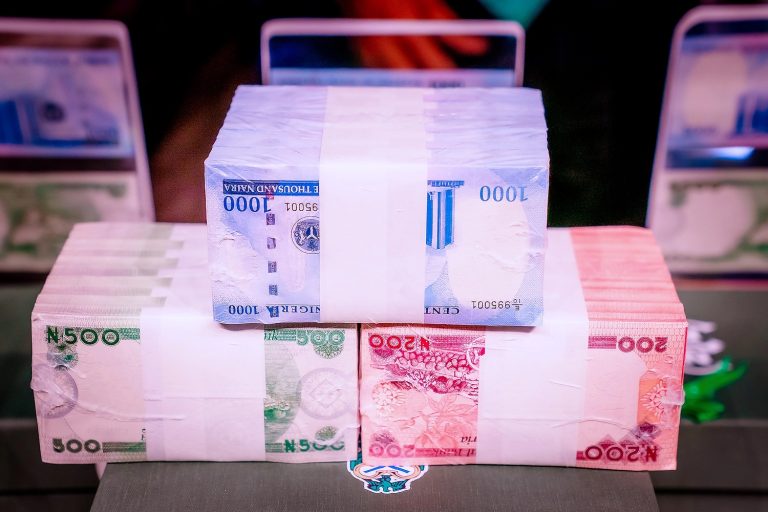
The Nigerian Naira experienced a remarkable appreciation against the US Dollar on Friday, closing at N789.94 per $1 at the official market. This surge was attributed to several government efforts aimed at bolstering foreign exchange (FX) inflow.
The Naira’s performance represented a substantial 6.26% increase from the previous day’s rate of N837.49 per $1. In the parallel market, the Naira also made a strong comeback, rising to N1,113 per $1 from its previous rate of N1,230 per $1.
During the day’s trading, the Naira reached an intraday high of N900 per $1, while the intraday low was at N696.06 per $1, indicating a wide spread of N203.94 per $1.
Register for Tekedia Mini-MBA edition 19 (Feb 9 – May 2, 2026): big discounts for early bird.
Tekedia AI in Business Masterclass opens registrations.
Join Tekedia Capital Syndicate and co-invest in great global startups.
Register for Tekedia AI Lab: From Technical Design to Deployment (next edition begins Jan 24 2026).
Data from the official Nigerian Autonomous Foreign Exchange Market (NAFEM) window revealed that the forex turnover for the day reached $259.84 million, marking a significant 129.50% increase compared to the previous day’s figures.
Additionally, Nigeria’s external reserves experienced a slight uptick, reaching $33.326 billion. This marks the ninth consecutive day of gains and keeps the reserves above the $33 billion mark, a trend that has persisted since July 2023.
To boost foreign currency liquidity in the economy and fortify the foreign exchange situation, the federal government has devised a plan to securitize approximately $7 billion of the country’s dividends from the Nigerian Liquefied Natural Gas (NLNG).
An official from Bola Tinubu’s administration told THISDAY that the government anticipates receiving $7 billion from a consortium led by Standard Chartered Bank in the coming week.
This is in addition to the $3 billion emergency loan secured by the Nigerian National Petroleum Company Limited (NNPCL) from the African Export-Import Bank (Afreximbank), bringing the total expected inflows in the short term to $10 billion.
Finance Minister Wale Edun, speaking at the Nigerian Economic Summit in Abuja, earlier this week, confirmed that the government is well-prepared for an upcoming surge of funds. He stressed that this injection of liquidity is expected to take place in the near future, likely within weeks, rather than being spread out over an extended period.
This initiative is being orchestrated by the Federal Ministry of Finance Incorporated, which is the shareholder of the NLNG.
President Bola Tinubu, speaking at the 29th Nigerian Economic Summit in Abuja, reassured Nigerians and investors of ongoing plans to enhance the country’s foreign exchange liquidity. He acknowledged the challenges faced by the business community in the financial markets and pledged additional FX liquidity to restore market confidence.
The source explained, “NLNG has been performing and used to pay dividends of about $6 billion, but because our oil production and gas production have fallen, dividends also fell to about $2 billion. But what this government has decided to do is to securitize these dividends over a period of time and use it to borrow money to curb the depreciation of the Naira against the Dollar.”
The goal is to increase dollar liquidity by injecting the market with a supply of dollars and pushing the Naira/Dollar exchange rate to approximately N800 per $1. This move is expected to help settle some old FX forward obligations, reduce pressure on the Naira, improve liquidity, and allow the currency to appreciate.
Market analysts believe that these measures may help the Naira appreciate to around N1,000 per $1 and potentially lead to currency speculators incurring losses. They also emphasize that achieving this goal would depend on improved oil production and significant reductions in crude oil theft.
These developments indicate a positive turn of events for the troubled Nigerian currency, which has faced intense pressure in recent weeks. The Nigerian government has recently employed a strategy that entails obtaining an immediate cash loan based on the anticipated revenues from a specified portion of future crude oil production. This approach was utilized by the Nigerian National Petroleum Corporation (NNPC) to secure a $3 billion emergency loan from the African Export-Import Bank (Afreximbank).




Buhari and his team deployed their subpar knowledge of economics, and we ended up worse than where we took off. It’s now the turn of Tinubu and his team to perform their own magic.
Initially you were told that he got the solution, and now you will be told that there’s nothing else he could have done. What will be next after this round of showing working?
We are already spending into our 2030 revenues like this.
We die here.